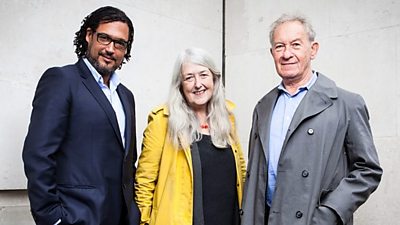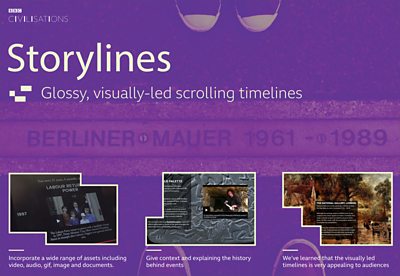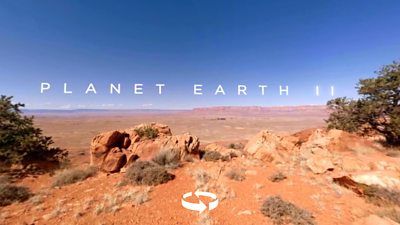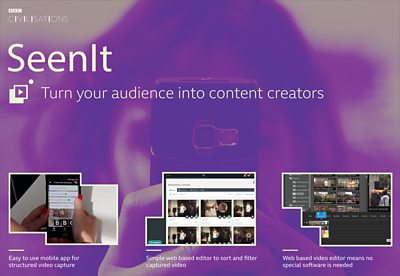
Civilisations is a new nine-part series, airing in the Spring, which will tell the story of human civilisation through art from prehistory to the present. A re-imagination of Kenneth Clark’s landmark series ‘Civilisation’ from the 60’s, the scope will be truly global; from ancient Rome to Iran, from China to Mexico, themes like creation, the human body and colour will be explored.

Museums will be able to use their existing content without having to commit to dedicated development resource, as they only need to provide a minimum of six pieces of material in order to create a really beautiful experience. Timelines are a popular way of giving context, and will help in explaining the history behind museums’ collections and the individual artefacts; we’ve also found through trials with BBC News that they are very popular with our audiences.
BBC Taster VR App We’re trialling a 360 Interactive Video tool using a third party platform called EEVO. This allows storytellers to create immersive experiences. One of the challenges that cultural organisations face is how to truly immerse their audiences in their collections - for example, many collections are often related to times past or perhaps are in remote locations or inaccessible to a wide audience. There has been a recent trend towards 360 video for cultural subjects but for many who have experienced content in this medium, it’s been found that a more interactive experience would be much more engaging.

Through the EEVO tool, the story instantly becomes more compelling, through the use of hotspots, branching narrative, and 3D audio features, as users have to interact with it and can choose their own path through the experience. Stories are brought to life, in a way that traditional 360 video has not previously allowed, and takes the user into the heart of the experience. The experiences made will live on the BBC Taster VR app (iOS | Android) and will allow us to trial the impact of this type of content on a wide, public audience.
BBC R&D - 360 Video and Virtual Reality
SeenIt We’re also trialling a user-generated video collaboration tool called SeenIt. This allows users to create authentic videos at scale, by actively engaging with their communities and audiences and making them contributors. It’s a unique tool that we’ve been testing to see if user generated content (UGC) on a topic can make for a compelling story, as well as spark conversation.

A set of challenges or tasks are set for these contributors, which act as prompts for filming. Their footage is then sent via the app to the SeenIt Studio, where a producer can collect, curate, edit and publish the user-generated content as part of a wider story. By using broadcast messages, the producer creates a running dialogue with the contributors and makes the task more conversational; this two way interaction creates a relationship between contributor and participant that is often not present in traditional forms of broadcasting.
SOMA SOMA Live Capture is a browser based vision mixer, which lets you mix between any number of cameras, pre-recorded video, audio and graphics for live broadcast from a remote location, via the internet, at low cost.
Built by BBC R&D, this tool enables remote live editing using R&D’s IP Studio infrastructure and we’ve already been trialling it through BBC R&D networks at large events, such as the Edinburgh Festival. SOMA takes out the need of all the costly equipment and staff used for a traditional broadcast - outdoor broadcast trucks, producers, directors, large camera crews etc and will allow the BBC to cover more smaller scale, niche events for our audiences. Museums will have the opportunity to use this to live broadcast small events, talks and panel discussions within the festival period where possible.
What about the AR App?
The benefits to our museum and gallery partners are numerous. Museums will receive advice and training from BBC R&D experts. Support will centre on cutting edge technologies, such as 3D scanning and interactive 360 video production to create unique content, giving them the opportunity to upskill their own teams where necessary.
Another aim of the project is also to provide legacy content; this content could be used for conservation, marketing and outreach by the organisations on a variety of platforms. Speaking of platforms, BBC Taster will give museums the chance to reach a new, young and international audience.
What will we gain from this?
One of the most important opportunities for us in R&D is that the project will give us a number of chances to validate our tools in the real world, in real life use cases. We’ll be able to test the impact of the tools and their subsequent experiences, allowing us to improve them, their processes, and understand what works well (and not so well) with the audience.
R&D often trial third party tools, to explore new innovative formats that aren’t currently being worked on within the department; this project is the perfect opportunity to do just that. There will be further opportunities to collaborate with us in the new year through Connected Studio, as we consider new licensable technology formats under the theme of participation. To stay up-to-date with our news, please sign up to our mailing list.
Overall, it’s a really exciting project to be involved in and we can’t wait to see what participants create. Watch out for our next blog post in the coming months, which will feature some of the content that’s being produced as well as a closer look at the making of the AR experience.
- Tweet This - Share on Facebook
- BBC Connected Studio - Civilisations & the Museum Sector
- BBC R&D - IP Studio: Lightweight Live
- BBC R&D - Building a Live Television Video Mixing Application for the Browser
- BBC Arts - Civilisations Festival
- Culture UK
- Arts Council of Northern Ireland
- Arts Council of Wales
- Arts Council England
- Creative Scotland
-

Future Experience Technologies section
This project is part of the Future Experience Technologies section
Topics
Search by Tag:
- Tagged with Blog Blog
- Tagged with Production Production
- Tagged with Internet Internet
- Tagged with Graphics and Effects Graphics and Effects
- Tagged with Participation Participation
- Tagged with Immersion Immersion
- Tagged with Future Experience Technologies Future Experience Technologies
- Tagged with Culture UK Culture UK


